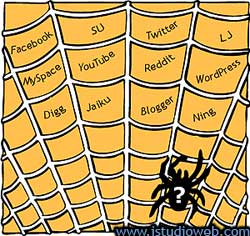Everybody’s raving (if I still can use this expression in ’09) about online tools: social media, Twitter, blogs, LinkedIn and getting on the front page of Digg. While not even remotely contesting the overall usefulness of each of these tools I’d like to take a step back and look at them from a different perspective.
Many small business owners (my direct clients and their peers) are asking me whether they should get a blog. Or if they should be on the Digg (it’s not the question of how – these things are up for sale and that’s the reality of the market). Should they go for promoting themselves on PRWeb or YouTube? Should they hire people to sparkle discussions on forums or start getting a gathering on MySpace?
There is, obviously, no single answer. There is, however, a good chance you will be able to make a decision based on the list below.
Twitter: if you don’t have a dedicated person who is willing to update the twitter stream constantly – DON’T use it. If you have a few large clients or if your clients are using your services once in a blue moon (like limo company) – DON’T waste your time for Twitter, use other means of getting your point across.
Blogs: if there is no one to keep up with posting to your blog – DON’T. It damages your image much more significantly if your prospective clients spot a blog that hasn’t been updated since last year and the only posts there are either obviously professionally crafted PR pitches, SEO texts or updates like “We moved to new address”. You don’t need a separate blog for content that would perfectly fit into your main web site structure. Discounts, promotions, case studies – they all belong to the main site.
Digg: if your company isn’t selling nationwide (or worldwide) – don’t waste your efforts on Digg. For the time, effort and money you spend getting on a frontpage of Digg and receiving that huge traffic bump you better off with more reasonable ways to advertise. Besides the fact that your web host may not be adeqate to support such a spike in visitors, most of them are not your target audience. Put your money where your clients are, and if it’s not Digg – DON’T waste your resources on that.
MySpace/Facebook: it’s hard to say what goes and what doesn’t for these two social platforms, but the same rule as with Twitter applies here. If your services or goods are one-time deal – DON’T waste your effort on building a significant presense on MySpace/Facebook. While it may look like it makes sense – chances are that once your service is consumed your clients would rarely come back to post their feedback. So unless you have a teenage kid who spends his time on MySpace and Facebook anyway and you can talk him into doing this stuff for you – DON’T waste your time, it’s not worth it. Abandoned two-year old profile with your old address and disconnected phone number is the last thing you want your potential clients to see before they try to contact you.
YouTube: converting traffic from YouTube is one of the hardest tasks so far. Aside from that – creating a good video takes time, posting it takes time, keeping tabs on what’s going on with it takes time – and you don’t even know who’s watching it. So unless you’re absolutely know what you are doing – DON’T spend your money and time on video. Spend it on AdWords, local ads or something that gets you better conversion.
As you can see – the list is not definitive and is stuffed with ifs and whens. As a general rule – try to estimate how many actual clients you will get for what price. Compare it with existing ways of advertising, see if you get a better deal there. With all the latest hype about online tools business owners forget about simple old-fashion advertising. It still works – stay tuned to find out how.
 While everybody is watching Olympics in China, there are couple of wars going on. There’s a war in
While everybody is watching Olympics in China, there are couple of wars going on. There’s a war in